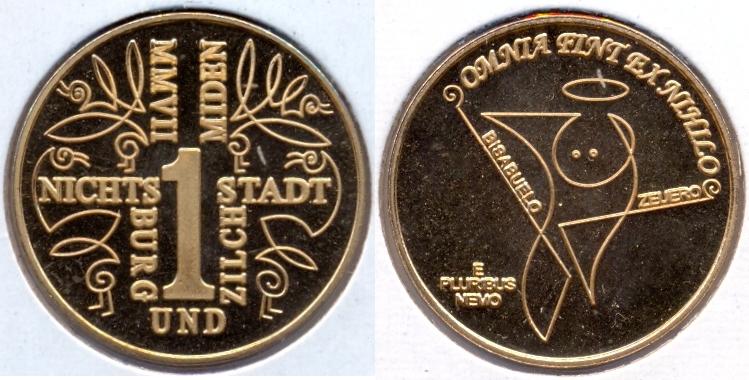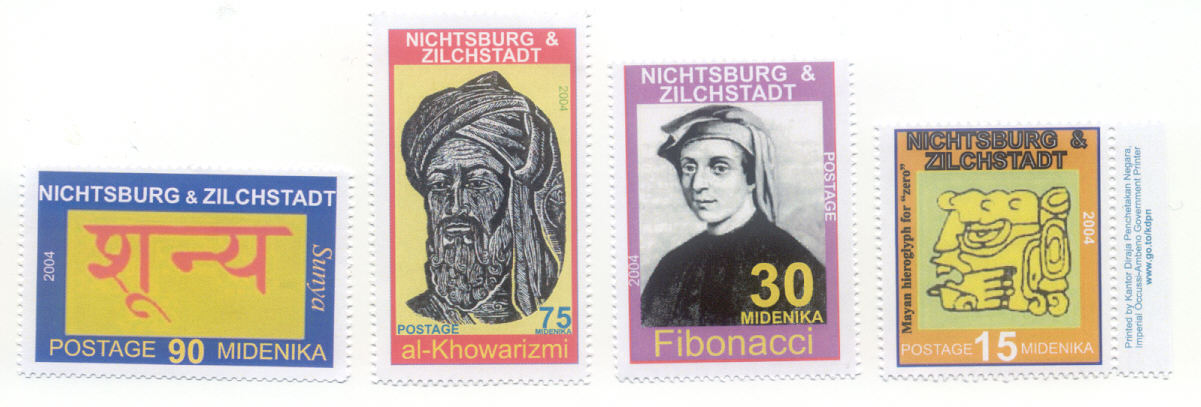 |
 |
| Nichtsburg et Zilchstadt |
| The inaugural Nichtsburg et Zilchstadt 1 Miden, dated 2003: As a writer of poetry, I (Erik Victor McCrea) am intrigued by language. Years ago, I toyed around with a character named Zero MacNaught (Mac meaning “son of”; hence, son of Naught, in an Irish and Scottish Gaelic vein) and his hometown, Zilchstadt (I liked the suffix -stadt because it was reminiscent of the municipal notgeld coins which fascinate me). It took time for all the other elements to slowly come together and to form a well-rounded theme, but ultimately, the idea for an attractive coin emerged, tying together my best-loved avocation (verse) and this most favored diversion of mine (numismatics). Once I actually put pencil to paper, the preliminary sketches gradually took an inventive course of their own. I then allowed those drawings to take me on a slow journey, fraught with variations and revisions, until they led me to a gratifying final version. Nichts is the German word for “nothing(ness)/naught/none/nil”, and Nichtsburg (I also liked the -burg suffix) became Zero's birthplace as well as the sister-city to Zilchstadt. Miden is the modern Greek word for “zero”, and this is the fictitious monetary unit. The reverse features a stylized rendition of our contemplative protagonist. Above him, forming an arc between his two outstretched hands (as if he were literally juggling the very theory), appears the epigrammatic Latin adage Ex Nihilo Nihil Fit: “out of nothing, nothing is made”, “from nothing, nothing is created”, “nothing arises out of nothing”, “from nothing comes nothing”, “nothing begets nothing”. Also emphasized is the dictum Ouden, Ad Infinitum: ouden is ancient Greek for “nothing”. | |
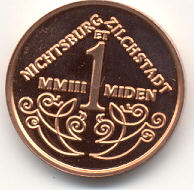 |
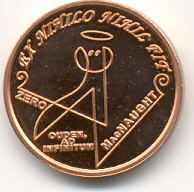 |
|
The language is meant to be playful, in a metaphysical sort of way. Perhaps Zero MacNaught is a nihilist, a non-entity, a cipher. Or perhaps his very “existence” is a negation of those notions. Furthermore, the coin is dedicated to the void from which all creativity emerges: the blank sheet of paper, the untouched canvas, the pristine silence. In order to create something that pleases the senses, artists must wrest meaning and form out of nothingness. This coin is 30mm in diameter, and 3mm thick. It was minted by the Northwest Territorial Mint, 65 pieces in copper and 10 pieces in silver. |
|
|
|
|
| Erik V. McCrea has decided to go further with a new design of Nichtsburg y Zilchstadt 11 Midenika, dated 2005. Midenika is the plural of Miden. In essence, the spirit of this coin is harmoniously faithful to the original premise. The obverse is crowned, in Devanagari script, by the Sanskrit word “shûnya/sûnya” (empty, vacuum, hollow, nullity, non-being, insignificance/absence). It is the term from which our revolutionary “zero” evolved; yet due to its enormous antiquity, there is insufficient consensus among scholars as to when this innovation genuinely arose. Incidentally, there's also a doctrine of vacuity called Shûnyatâvâda, closely associated with the Mâdhyamika sect of Mahâyâna Buddhism. The reverse centrally highlights “kyomu”. This is the Ch'an/Zen Buddhist designation, written in Japanese Kanji ideograms/logograms, for “nihility/nothingness”. It is also a central tenet of the Kyoto School of philosophy (Nishida Kitaro, Tanabe Hajime, Nishitani Keiji). Symmetrically flanking it are two terse aphoristic phrases culled from Kabbalistic ontology: “ayin me’yesh” (emptiness from fullness) and its converse, “yesh me’ayin” (somethingness out of nothingness). | |
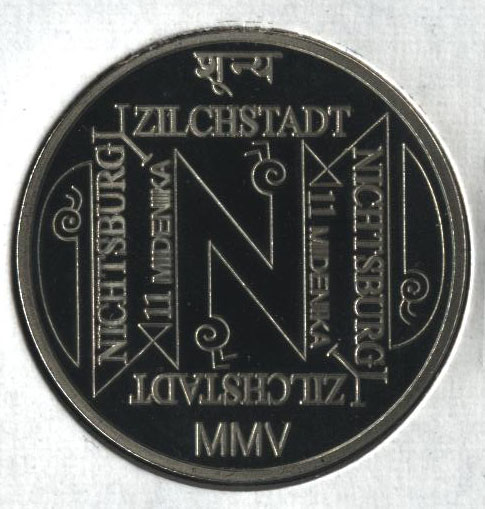 |
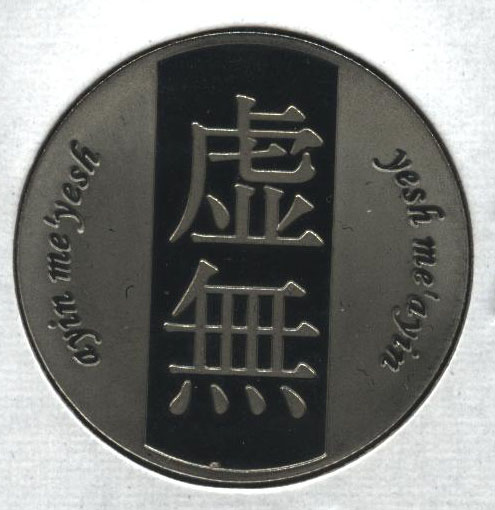 |
|
This new design coin dated 2005 is now available. It is 38mm in diameter with 2.3mm thickness. It was minted by Pressed Metal Products, 51 pieces in copper-nickel and 5 in silver. There are also 3 pre-production samples: one commercial bronze, one cartridge brass and one 24K gold-plated brass. |
|
|
|
|
| The Nichtsburg und Zilchstadt 1 Miden, dated 2007: The trilogy concludes with this coin. Stylistically, whilst it is entirely in keeping with the pre-established motif of its two predecessors, it is more of a “sequel” to the 2003 piece than was the 2005 piece. It is also its antithetical counterpart, insofar as it accentuates a statement, Omnia Fint ex Nihilo, which seemingly contradicts the one on the first coin. This motto means “everything is created from nothing”, “out of nothing, all things are made”. Also on the reverse, one of Zero MacNaught’s forebears is given prominence: Bisabuelo Zeuero is our protagonist’s great-grandfather. Zeuero, along with zevero/zefiro/zepiro, is the Italian equivalent of “zero”. Etymologically, the word can be traced back to the Latinized zephyrum/ziphirum/cephirum, derived from the Arabic sifr/syfr (vacant), which was a literal translation of the meaning for the Vedic shuunya. Other forms include tziphra, tsiphron, ziffra, cifra, cifre, chiffre, chiffer, ziffer. Also present on the reverse is the motto E Pluribus Nemo. In Latin, the word nemo (a contraction of ne-homo, “no-man”, “no-one”) signifies “nobody”. | |
| This coin is 30mm in diameter, and 2mm thick. It was minted by Pressed Metal Products, in a run of 51 bronze and 10 silver (plus 4 pre-production samples: one brass, one copper, one copper-nickel, and one 24k gold-plated brass). | |
| I got my Nichtsburg et Zilchstadt 1 Miden 2003 copper coin from Joel Anderson (www.joelscoins.com). The 11 Midenika 2005 and 1 Miden 2007 coins from Erik V. McCrea (http://erikmccrea.tripod.com/index.html). You can also email Mr. Erik V. McCrea at evm111@hotmail.com and for more information click at: http://erikmccrea.tripod.com/zilchstadt.htm. | |
|
|
|
It was put inside nothing. Nothing was added to it And to prove it didn't exist Squashed flat as nothing with nothing.... Ted Hughes, “Conjuring in Heaven” |
|
| Micro-Nations | |
| Chiefa Coins | |
